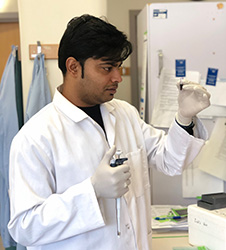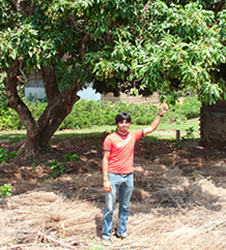Tuesday 15 December 2020 12:00pm

Associate Dean Research at the Otago Medical School, Aniruddha Chatterjee.
From his first outdoor classroom under a tree to the cutting edge of global epigenetics research, it has been quite an academic journey for Aniruddha Chatterjee.
The 36-year-old has just been appointed Associate Dean Research at the Otago Medical School – Dunedin Campus, one of the youngest to ever gain that position.
The appointment is the latest in a long list of achievements for Dr Chatterjee, including winning the Rutherford Discovery Fellowship in 2017 and a travelling role as an Education New Zealand (Ministry of Education) International Ambassador.
The research star, who has his own laboratory in the Department of Pathology, is brimming with energy and keen to get started in the new role.
“I am really thrilled and thankful. I feel it's a really good, positive step for the Otago Medical School to appoint someone so young. It shows the trust in the next generation of leadership.”
Dr Chatterjee has been at the University of Otago for 11 years after arriving here to complete his doctorate.
Dunedin was a long way from his first two years of school education which began in an outdoor classroom in village in West Bengal, 200 kilometres from Calcutta, from ages 4 to 6.

“There were lot of challenges. But I really loved it. I learned great life lessons during this time.”
His family moved to the Berhampore city and his love of science blossomed at high school before he studied at Osmania University, Hyderabad, where he graduated with a triple major in biotechnology, biochemistry and chemistry.
After completing his Master’s degree in biotechnology from the Vellore Institute of Technology, he took advantage of a government-funded scholarship to come to Otago.
He jumped into the emerging field of epigenetics and has never looked back.
At Otago, after playing a leading role in generating some of the first epigenetic maps in human blood cells, melanoma, oral cancer and the model organism zebrafish, he is now expanding work in colorectal, lung and prostate cancers.
He says his laboratory's dream is to assign function to every single DNA methylation change that could possibly occur in a cell so that ultimately epigenetic changes could be used to predict and prevent cancer.
“I have a very strong commitment Otago. I went to overseas many times on fellowships or to learn technology and to bring it back to Otago. Because it's important that you are relevant to the world and do cutting-edge science in your area.
“You don't want to be world famous in New Zealand. You want to be world famous in the world.”
Winning the Royal Society of New Zealand’s Rutherford Discovery Fellowship to study the epigenetics of metastasis - or the way cancer spreads to other organs – was “quite incredible opportunity”
“I think again that was an acknowledgement of my commitment to New Zealand. Not just being based here but really bringing the best from everywhere to this place.. Absolutely I feel that I'm part of this society and it feels home here .”
The challenges posed by the COVID-19 pandemic have shaped the way he wants to approach the Associate Dean Research role.
“The role has many layers to it but one of my vision is support the early and mid-career researchers because in this current timing, with the COVID disruption, I think it's particularly challenging for the next generation researchers to continue build their work in New Zealand. So, I'll be particularly mindful of that.
“Overall, there are two types of impact that we have to focus on. One is the international scholarly impact. We want to do work of the absolutely highest standard here and publish top level work. But there is also the local impact of engaging with communities, aligning our research so that it benefits New Zealand. And they are not separate as such, they go hand in hand.”
“Research should translate into something that might be beneficial. It's not always about developing a new drug - there's many ways of bringing the benefit to the community. And that will, of course, require of people's involvement, engagement or input.”
Outside the lab, Dr Chatterjee likes to stay active with sports and has been involved in many community activities such as helping organise the world’s southern-most Durga Puja Indian festival in Dunedin from 2017-2019.
He’s a bit of a cricket fan and way before he ever set foot in New Zealand, he could name the country’s cricket grounds and their capacities.
Cricket also helped cement his relationship to Dunedin because former New Zealand captain Brendan McCullum was the star batsman for his team the Kolkata Knight Riders in the Indian Premier League.
“Brendan is a star in our place so before I actually decided to come to New Zealand I already knew about Dunedin.”
For more information, contact:
Sean Flaherty
Communications Adviser, Otago Medical School (Dunedin campus)
Mob +64 21 279 5305
Email sean.flaherty@otago.ac.nz
